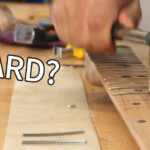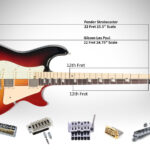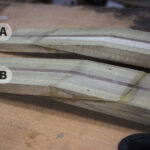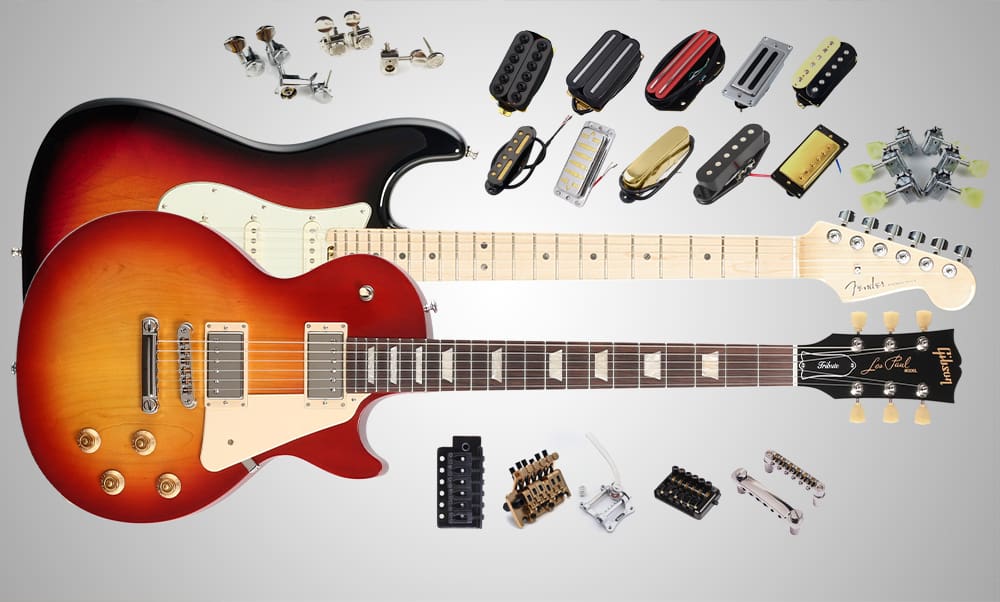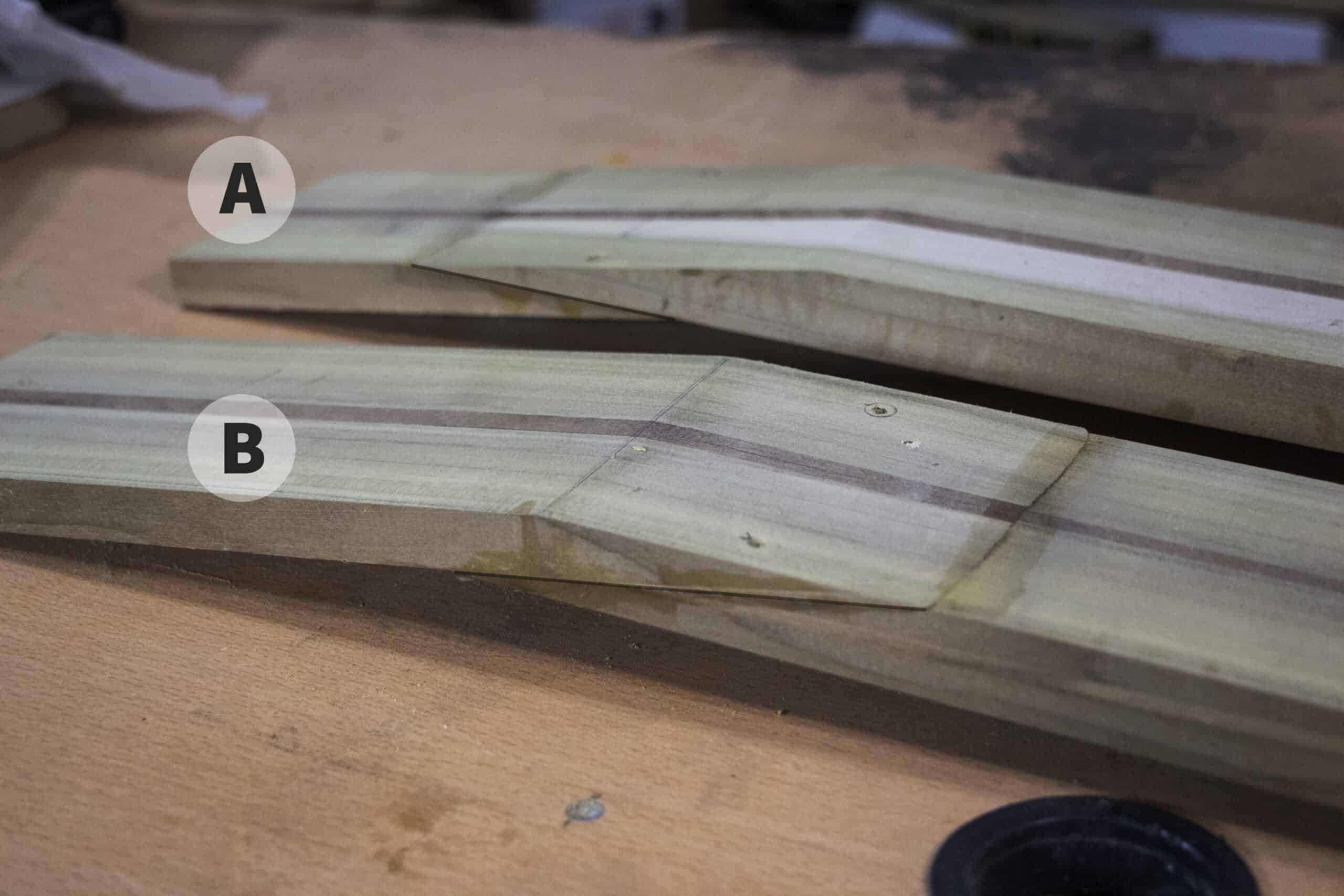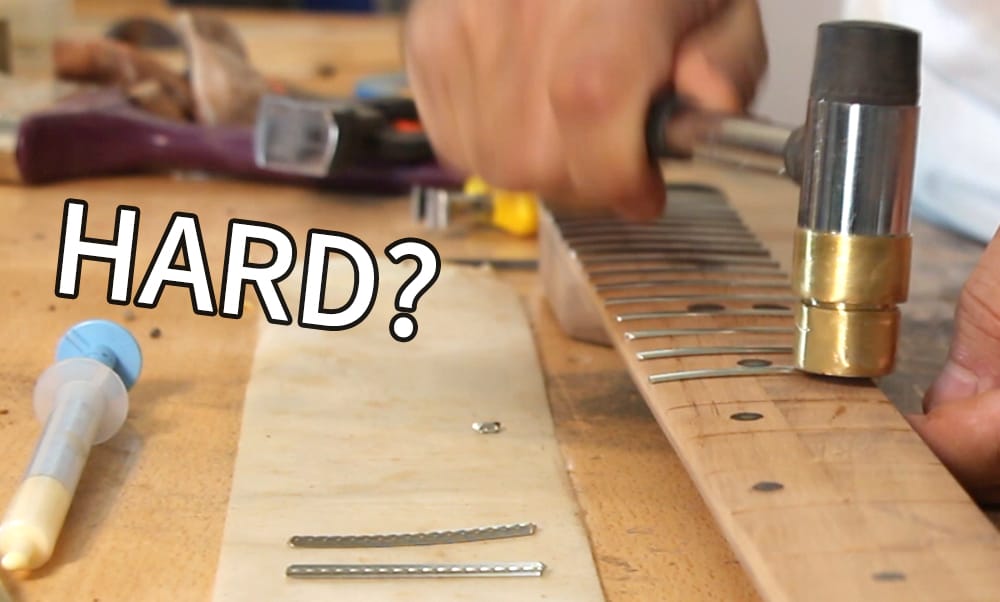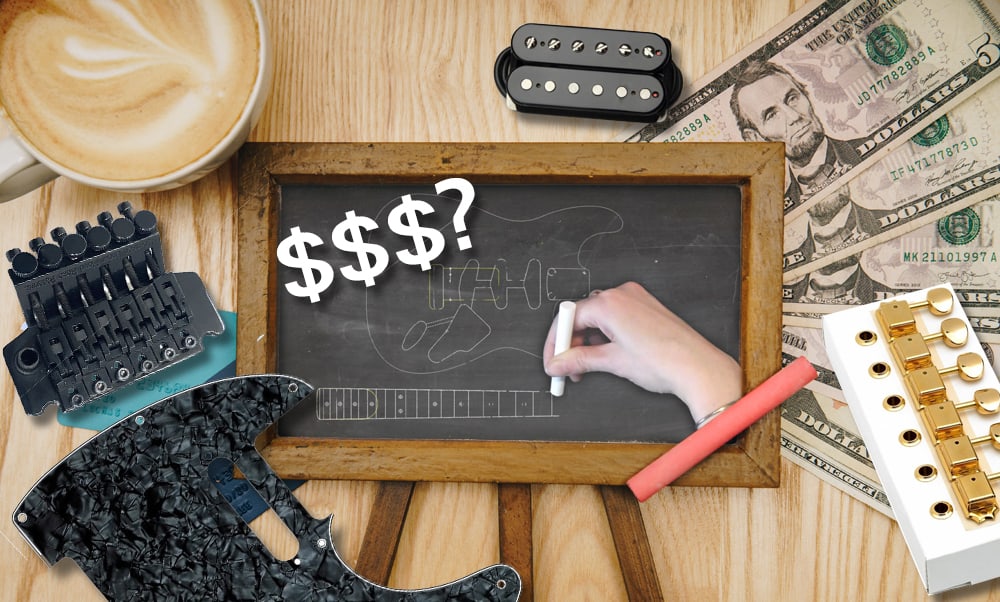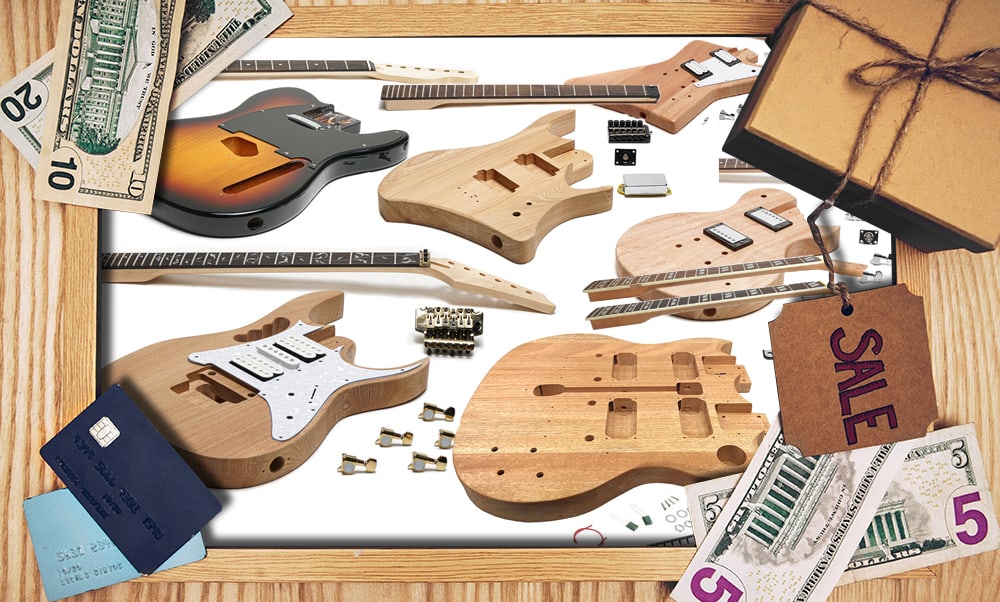The Iconic look of a Strat or a Les Paul is immediately recognized by any guitarist and builder. Many first-time builders will aspire to make one of their own and many long-time players wish to customize such models for themselves. There is more than one way to go about granting yourself this wish.
Ways to create your own can be divided into these routes:
- Order all original (or better) parts to create a custom-made replica
- Build from scratch using all original parts
- Build from scratch using replacement parts (the budget route)
- Buy and assemble a full Guitar Kit of the guitar of choice
‘Building a Guitar’ is what you make it
Not everyone who wants to build a guitar also aspires to become a full-fledged Luthier and doesn’t necessarily need to become one. ‘Building from scratch’, ‘putting together’ or ‘assembling’ are all legitimate roads to creating an instrument you can call your own making. These different methods have their pros and cons as well as a very wide range of price tags. Let’s dive into the details to see if one of them fits you. Of course, there are multiple combinations between them but you will be able to figure those out in a little while.
The reasons and considerations
The way you may choose will have much to do with the reason why you want it to begin with. A DIY enthusiast will have a very different motivation than a seasoned guitarist wanting to create his own ultimate instrument. You may be looking at it as a nice weekend project or a project you will throw yourself and commit to with long hours of learning and even longer days in the workshop. All reasons are valid, but will surely lead to different approaches. Building from scratch will defiantly require much more work and effort than any form of assembly. Let’s first take a look at some of the consideration which may sway you or help make up your mind.
The budget
The tolerance between the cheapest way to create a guitar from scratch to putting together your ultimate, ‘Price is not issue’ instrument can be easily over a thousand dollars. The two biggest factors can be the parts you will be ordering, and whether you will be building the body and neck yourself, or ordering them. Much like the parts the wooden parts can also be ordered as original or replacement, with a significant price difference. The parts themselves can run between 130$ if you are ordering directly from China or the cheapest you can get on Amazon, to over 650$ for premium and original parts. Bodies can start around 40$ for Chinese-made or blanks and climb to over 500$ for originals and custom paints. Necks Blanks can start at 30$. You can find shaped and fretted necks for under 50$ and over 600$ for the top end and original ones.
Skills & Tools
Building a kit will or assembling premium bought parts requires some basic tools most hobbyists will probably have in their garage, and if they do decide to step it up a notch and buy some basic setup tools, both the price and the learning curve are reasonable. Building a guitar from scratch, however, is a whole different story.
Learning Curve
Building a guitar is a bit of a multidisciplinary endeavor. Aside from ‘standard’ carpentry necessary for the basic construction of the body and neck, you will also need to figure out fretting. From installing the frets to leveling and crowning, there is plenty to perfect there. Some electronic work is also required, and for some guitars it can get relatively complex, especially with no background. Finishing and polishing is another topic which can fill your spare time by itself. Of course, you don’t need to become an absolute expert at all of the above, but you do need a certain level of competence to be able to produce a reasonable-looking and sounding guitar, (assuming that is the minimal bar).
Your workshop
There is no limit to the number of tools a Luthier can possess, and they are certainly not all needed all the time, but there are quite a few which are absolutely essential. Even if you have a relatively nicely arranged garage or home workshop, there are probably some more specific tools you will need, and some you will not find in your local hardware store. You can find a comprehensive list in “The Ultimate Guide to Electric Guitar Building Tools”
Building a Kit
Kit guitars are a wonderful way to build your own instrument, whether you are interested in pursuing it as a hobby, or just a one-time project. If you are not familiar with guitar kits, they will typically include all the parts and hardware and will have an unfinished, precut, and routed body. The neck will also be unfinished but will be fretted. There are variations that may have different levels of finishing, which will allow a wider range of customization on the builders’ part, but typically very minimal work will be required as far as shaping drilling or routing. Most kits will be a sort of replica of guitar models most guitar players or enthusiasts will be familiar with.
The Pros of Kit Guitars
- The kit will take away a lot of the guesswork and will provide you with all the parts and little details to fit and match the guitar you want.
- Many kits come unfinished and will leave you plenty of room to choose a color and finish which can really make it your own if you choose to.
- Aside from the finish and drying time, this can be a weekend project.
- This can be a starting point for upgrades and improvements.
The Cons of Guitar Kits
- As mentioned, most do not come finished. If painting and coating are not your ‘thing’, this may become a chore. You can always get away with a few coats of oil, but if you‘re a fan of the glossy factory finish and you don’t have the equipment and/ or the experience or are willing to put in a lot of ‘elbow-grease’, the outcome may disappoint you. (There is a growing selection of finished guitars)
- The hardware is generic at best. The very cheap kits are going to have very cheap hardware.
The cost of Guitar Kits
Standard guitar kits will usually sell between 150$ and 350$ with a very wide variety of models and styles. A few stores such as Stew mac have Wilkinson Sits selling for up to 600$ and Crimson Guitars in the UK sell their own guitar kits for £149.00 GBP – £665.00 GBP (No hardware included). For more specific prices and models, you check our ‘ Recommended Gear’ page.
Build a ‘Real Replica’ from scratch
This is what many aspiring Luthiers will choose, and if taking the time to master the skills (to a satisfying degree) and equipping yourself with a minimal amount of tool, you can build a guitar from the ground up, just like a custom shop. By ‘real Replica’ I am referring to the quality and source of the parts and materials. This will include genuine parts (or reputable replacement companies) and the correct wood sourced and processed professionally. (‘PineCasters’ are great, but are not made as guitars by Fender.) The point is not to get hung up on using the exact batch of hardware with the correct neck shape of the particular make and model, but to keep the standard of the original.
Gibson lovers are the exception and are welcome to obsess about any tiny detail. Click here to find Gibson specs for pretty much any Gibson Guitar produced
The Pros of Building a ‘Real Replica’
- Properly executed, you can build yourself a quality guitar, which is all yours.
- The guitar has the exact features of your favorite guitar.
- Still way cheaper than buying a guitar with these specs, off the shelf.
- The next one is going to be even better.
The Cons of Building a replica
- It’s not going to be cheap. Those parts and materials are not of the cheap kind, and to pull off a good job, as a first-time builder, you are probably going to spend a bundle on tools and materials.
- There are no guarantees. Not going to sugar-coat it. Lutherie takes years to learn and perfect. The chances of anyone (myself included) pulling off a custom shop quality guitar on their first try is not 100%. There is a good chance it will be a great guitar and the few imperfections, that only you notice, will make you love it even more. But it might be just a bit off.
The Price of a Replica
Most factory guitars are not made with the most expensive hardware you can find, so purchasing original Tuners and Bridges will not necessarily break the bank. They are not going to be the cheapest, but somewhere in the mid-range. Having said that there is a very wide range of prices within many models of guitars we are familiar with and hardware which has changed over the years. Unless you have a spec list of a specific model, it is hard to estimate the cost.
For example:
Gibson Tuners are 90$-120$, Pickups are 130$-200$ for a set
Fender Tuners are 40$-110$, Pickups can be 90$-250$ a set
This gets even “worse” with brands like Ibanez and all their artist line of guitars. They all have completely different specs.
Build a guitar of your liking from scratch
This is the flexible, budget choice. Of course, you can model it after your favorite model, but you don’t have to buy the original parts. With this method, you can find great deals on Amazon or other stores, and order the style and colors of your choice.
The pros of building on your own
- Maximum flexibility. You make the choices of hardware standard
- Budget. You can really cut the cost of hardware without the hardware.
The Cons of building on your own
- It’s up to you to make sure you are getting all the correct parts (You can still rely on original specs)
- Cheap parts, from China or Amazon, may occasionally not stand to the task or the quality you wished for.
The Dream Custom Guitar Route
This will involve taking your dream guitar, breaking the specs to a shopping list, and then finding the best place to buy it. You will in fact be creating your own custom kit and then assembling it.
The upside of this method
You will be getting the most amazing guitar you can build.
There Cons of building your dream guitar
- Price will inevitably be high with all the top end hardware
- There is one catch. Other than Fender, it is difficult to find a replacement or original bodies and necks for any other guitar. You can still find them on various Chinese and occasionally on eBay, but they are definitely not originals.
Conclusion
There is no bad way or reason, to build a guitar. The very worst thing that can happen is that it doesn’t work out and yes, you could suffer the cost and lose some time, but is a risk with many hobbies, a few of which will end up with a guitar.
It really comes down to why you want to build a guitar. The rest of the decisions will come, and so will the funding. Good Luck

